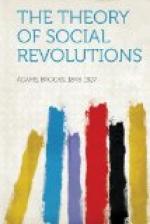What interests us, however, is not so much what the Federalists thought, or the motives which actuated them, as the effect which the clothing of the judiciary with political functions has had upon the development of the American republic, more especially as that extreme measure might have been avoided, had Pinckney’s plan been adopted. Nor, looking back upon the actual course of events, can I perceive that, so far as the movement toward consolidation was concerned, the final result would have varied materially whether Congress or the Supreme Court had exercised control over state legislation. Marshall might just as well, in the one case as the other, have formulated his theory of a semi-centralized administration. He would only have had uniformly to sustain Congress, as an English judge sustains Parliament. Nor could either Congress or the Court have reached a definite result without an appeal to force. Either chamber might expound a theory, but nothing save an army could establish it.
For two generations statesmen and jurists debated the relation of the central to the local sovereignties with no result, for words alone could decide no such issue. In America, as elsewhere, sovereignty is determined by physical force. Marshall could not conquer Jefferson, he could at most controvert Jefferson’s theory. This he did, but, in doing so, I doubt if he were quite true to himself. Jefferson contended that every state might nullify national legislation, as conversely Pinckney wished Congress to be given explicitly the power to nullify state legislation; and Marshall, very sensibly, pointed out that, were Jefferson’s claim carried into practice, it would create “a hydra in government,"[10] yet I am confident that Marshall did not appreciate whither his own assertion of authority must lead. In view of the victory of centralization in the Civil War, I will agree that the Supreme Court might have successfully maintained a position as arbitrator touching conflicting jurisdictions, as between the nation and the states, but that is a different matter from assuming to examine into the wisdom of the legislation itself. The one function might, possibly, pass by courtesy as judicial; the other is clearly legislative.
This distinction only developed after Marshall’s death, but the resentment which impelled Marshall to annul an act of Congress was roused by the political conflict which preceded the election of 1800, in which Marshall took a chief part. Apparently he could not resist the temptation of measuring himself with his old adversary, especially as he seems to have thought that he could discredit that adversary without giving him an opportunity to retaliate.




